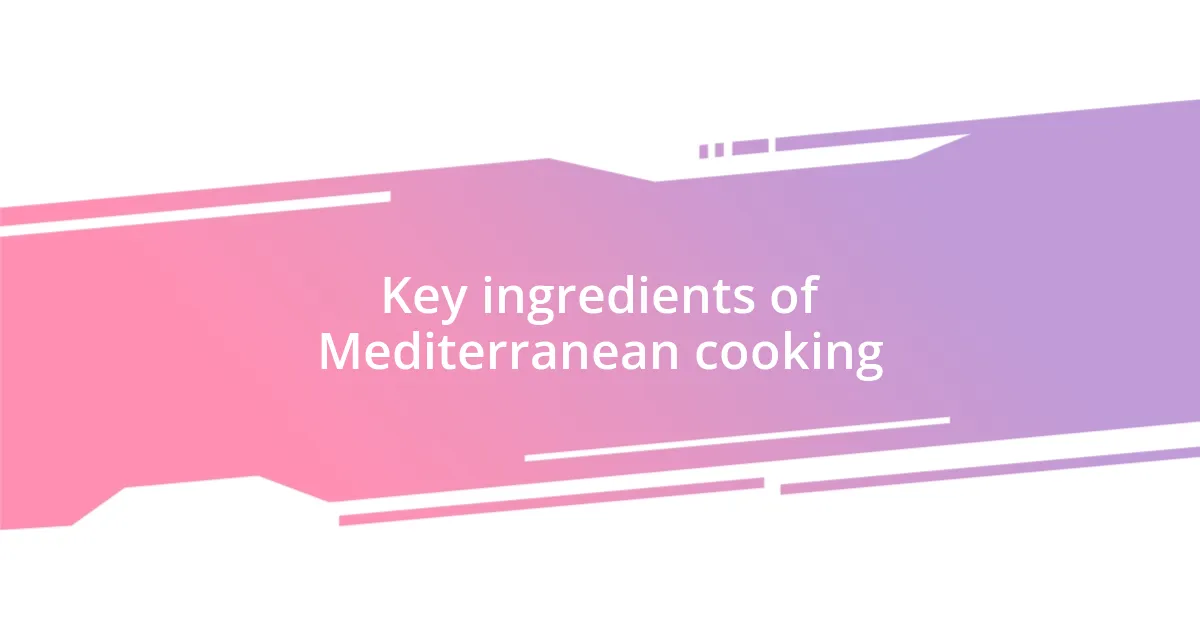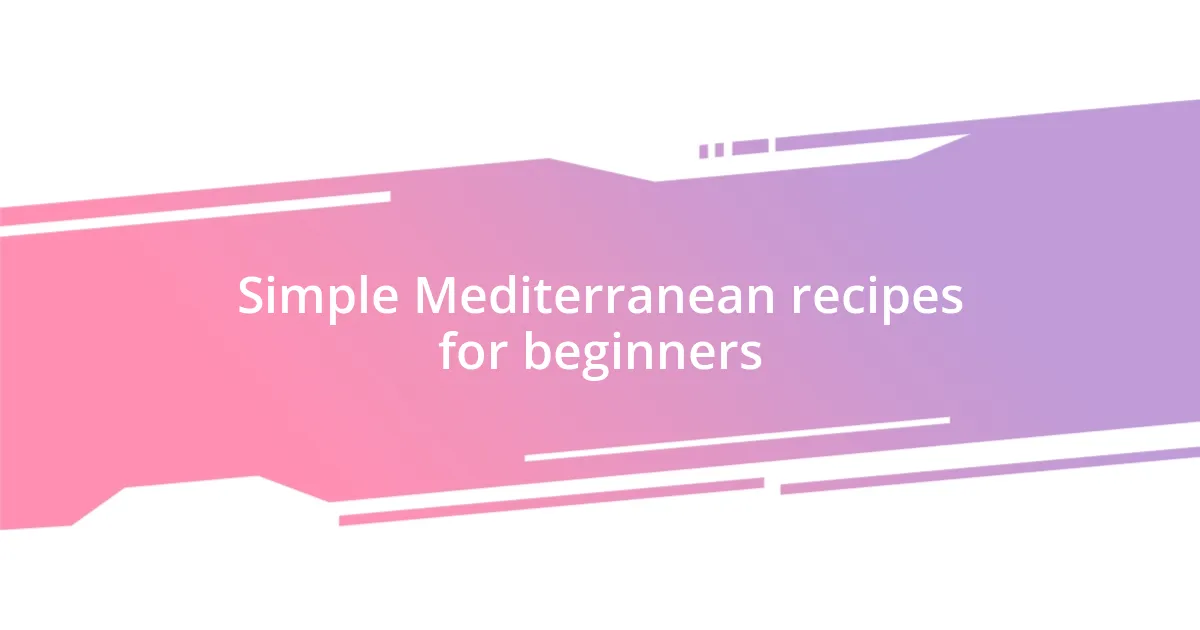Key takeaways:
- The author’s first encounter with Greek tzatziki sauce sparked a passion for Mediterranean cuisine and healthy eating.
- The Mediterranean diet emphasizes whole, unprocessed foods, healthy fats, fruits, vegetables, and moderate dairy.
- Key ingredients like olive oil, fresh produce, and herbs greatly enhance the flavors and cultural richness of Mediterranean dishes.
- The health benefits of Mediterranean meals include improved heart health and reduced inflammation, making food choices feel empowering.

My journey into Mediterranean cuisine
I vividly remember the first time I tasted a classic Greek tzatziki sauce. The coolness of the yogurt mixed with the crunch of fresh cucumber brought back memories of summer picnics by the Mediterranean Sea. It struck me then how food can transport us to different places and times, making shared experiences so much richer.
As I began exploring Mediterranean cuisine more seriously, I was captivated by the vibrant colors and bold flavors of each dish. Cooking ratatouille for the first time was a revelation; I could taste the love and tradition in every bite. Have you ever realized how food can evoke such strong feelings? For me, it sparked a passion for healthier eating habits, transforming my kitchen into a little Mediterranean haven.
Visiting local Mediterranean markets was another eye-opening experience. Wandering through stalls filled with aromatic herbs and fresh produce, I found myself experimenting with new ingredients, like sumac and harissa. Each new flavor introduced a world of possibilities, prompting the question: how can something so simple, like olive oil drizzled over ripe tomatoes, feel so luxurious? It’s this journey, filled with exploration and joy, that truly deepened my appreciation for Mediterranean cuisine.

Understanding the Mediterranean diet principles
The Mediterranean diet is more than just a way of eating; it’s a lifestyle that emphasizes balance, flavor, and health. At its core, this diet promotes whole, unprocessed foods and a rich variety of flavors, which I discovered during a memorable cooking class in Lisbon. There, the instructor passionately explained the diet’s principles, and I felt inspired to fill my plate with vibrant vegetables, whole grains, and lean proteins.
Key principles of the Mediterranean diet include:
- Fruits and Vegetables: A wide range, ideally 5-10 servings a day, which I find makes every meal feel fresh.
- Healthy Fats: Predominantly olive oil; I personally adore using it to enhance my favorite salads, making them both nutritious and delicious.
- Whole Grains: Foods like whole grain pasta and quinoa, which I frequently incorporate to keep my meals hearty and satisfying.
- Fish and Poultry: Lean sources of protein that I often grill, adding a savory touch to my dinner.
- Nuts and Seeds: Snacks that I genuinely enjoy on-the-go, bursting with flavor and nutrition.
- Moderate Dairy: Mostly from cheese and yogurt, which I love for their creamy textures and tastes.
- Red Wine: In moderation, it’s a delightful addition that I appreciate during social gatherings.
I remember feeling particularly energized after a week of adhering to these principles. Each meal not only nourished my body but also my spirit, reminding me why I fell in love with this cuisine in the first place.

Key ingredients of Mediterranean cooking
I find it fascinating how the key ingredients of Mediterranean cooking are not just staples but also a testament to the region’s rich cultural heritage. Olive oil stands out prominently; its peppery flavor and silkiness can elevate even the simplest dishes. I remember a dinner with friends where we drizzled high-quality extra virgin olive oil over grilled vegetables. It was as if the dish transformed, leaving everyone raving about its exquisite taste.
Another essential component is fresh produce, particularly tomatoes, cucumbers, and bell peppers. I can still recall the vibrant colors at a local farmers’ market in Santorini. The tomatoes were juicy and sweet, and I couldn’t resist buying a basket full. When I made a Greek salad later that evening, each bite felt like summer on my plate. It’s amazing how a handful of fresh ingredients can create such delightful memories.
Herbs and spices, like oregano and garlic, also play a vital role in Mediterranean dishes, bringing warmth and character to every meal. The first time I used fresh oregano in a homemade pizza, I was amazed by the fragrant aroma that filled my kitchen. The taste was one of pure joy, making me realize the significant impact these simple ingredients can have on elevating our culinary experiences.
| Ingredient | Description |
|---|---|
| Olive Oil | Rich in healthy fats, used as a base for many dishes and dressings. |
| Fresh Produce | Ingredients like tomatoes, cucumbers, and bell peppers form the colorful backbone of Mediterranean cuisine. |
| Herbs & Spices | Essential for flavoring, with garlic and oregano among the most popular choices. |

Health benefits of Mediterranean meals
The health benefits of Mediterranean meals are as enticing as their vibrant flavors. For instance, the abundance of fruits and vegetables in this diet supports heart health, a fact I’ve come to appreciate following my own journey with nutrition. One evening, while savoring roasted eggplant and rich, ripe tomatoes drizzled with olive oil, I noticed not only the flavors but also how light and nourished I felt afterward. Isn’t it fascinating how food can impact our bodies so profoundly?
Incorporating healthy fats, particularly from olive oil, is another standout feature of Mediterranean cuisine. I recall a meal where I prepared a simple chickpea salad, and the addition of rich olive oil made such a difference. I could almost feel my heart thanking me—after all, studies suggest that olive oil can help reduce inflammation and lower cholesterol levels. Have you ever had a moment where you realized your meal was doing good for your body? That’s what I felt; it’s empowering to know what we choose to eat can support our well-being.
Additionally, the Mediterranean diet encourages moderate consumption of fish, which is a fantastic source of omega-3 fatty acids. During a memorable seaside trip, I had the freshest grilled fish, and with each bite, I felt energized and rejuvenated. I’ve found that understanding the link between my food choices and their health benefits makes every meal an opportunity to nourish myself. What more could one ask for than a diet that delights the palate while promoting wellness?

Simple Mediterranean recipes for beginners
One of my go-to simple Mediterranean recipes is the classic Greek salad. I love how it blends crunchy cucumbers, sweet tomatoes, and tangy feta cheese, all tossed together with a drizzle of olive oil. The first time I made it for a summer picnic, I couldn’t believe how quickly it disappeared. Have you ever noticed how some dishes have that irresistible charm?
Another beginner-friendly recipe that never fails to impress is roasted vegetables. I remember the first time I combined eggplant, zucchini, and bell peppers, seasoned them with garlic and herbs, then let them roast in the oven. It filled my kitchen with such an inviting aroma! After enjoying that meal, I understood how simple ingredients, when prepared with care, can create an experience that warms the heart.
Pasta with olive oil, garlic, and a sprinkle of oregano is a quick dish that feels like a comforting embrace. I often whip it up when I have a busy day, yet still crave something satisfying. It’s amazing how a few pantry staples can come together so effortlessly. Don’t you think cooking should feel like a celebration, even on the busiest nights?

Tips for incorporating Mediterranean foods
When it comes to incorporating Mediterranean foods into your diet, starting with fresh ingredients is key. I remember my first trip to a local farmer’s market—it was a sensory delight! The vibrant colors of the fruits and vegetables caught my eye and inspired me to try new recipes. Have you ever felt that urge to experiment with fresh produce? I certainly did, and it opened the door to countless Mediterranean meals that are both delicious and nourishing.
Another effective way I’ve found to embrace Mediterranean cuisine is by swapping out conventional ingredients for healthier, Mediterranean alternatives. For example, using quinoa instead of rice not only introduces a nutty flavor but also boosts the nutritional value of my dish. The first time I made a Mediterranean-inspired bowl with quinoa, grilled veggies, and a dollop of hummus, I couldn’t help but smile at how satisfying it felt. Isn’t it rewarding when what you eat aligns with both your taste and your health goals?
Don’t underestimate the power of spices and herbs to transform your meals! I recall sprucing up a basic grilled chicken with a blend of oregano, rosemary, and lemon juice. The aroma filled my kitchen, making me feel like I was sitting in a cozy Taverna overlooking the sea. It made me wonder—how many ordinary dishes could become extraordinary with just a sprinkle of creativity? Trying out different seasoning combinations has not only enhanced my cooking but has turned mealtime into a vibrant celebration.

My personal favorites and insights
One of my all-time favorites is the Mediterranean mezze platter. I still remember the first gathering I hosted where I laid out a colorful spread of hummus, baba ganoush, olives, and warm pita. Watching my friends sample the different flavors and enjoy each bite felt incredibly satisfying. Have you ever noticed how sharing food can create a unique bond among people?
I also have a soft spot for lemon orzo salad. The zesty brightness of lemon mixed with fresh herbs always makes me feel refreshed. I can recall a sunny afternoon where I prepared it while lounging on my balcony, and just the aroma alone transported me to a sun-soaked day by the Mediterranean coast. Isn’t it amazing how certain dishes can evoke such vivid memories?
When it comes to dessert, I can’t resist a slice of baklava. The layers of flaky pastry drizzled with honey and nuts offer a delightful crunch that makes me savor each bite. I vividly remember the first time I tried homemade baklava at a local café; it was like a sweet hug that lingered long after the last bite. Every time I indulge in it, I can’t help but ask myself—how does something so simple pack such an emotional punch?














